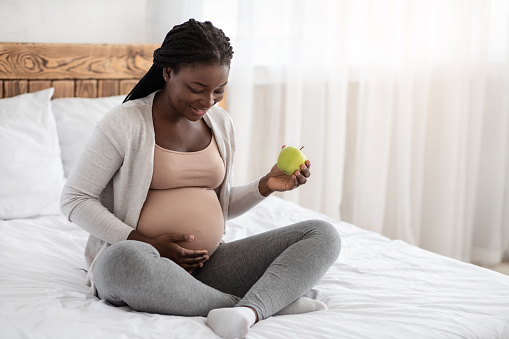You’ll often hear the myth that a pregnant woman should eat for two. This misconception is peddled by well-meaning folk offering your all manner of food once they realize you’re pregnant. What most don’t realize is that it’s common for you to be feeling full during pregnancy first trimester.
Your body is undergoing drastic changes during the initial stages of your pregnancy. These are responsible for feeling full or bloated during the first trimester. High levels of hormones like progesterone cause the slowing down of your gastrointestinal system, which results in increased gas.
Feeling full and gassy isn’t a problem, especially for those that get similar symptoms pre-period. But this time, it’s compounded with other early pregnancy problems like morning sickness, fatigue, dizziness, constipation, and heartburn. In that view, let’s approach bloating as an expected part of your gastrointestinal issues during the first trimester.
When Is the First Trimester, and What Causes Feeling Full?
From the moment of conception, up to the end of 13 weeks is your pregnancy’s first trimester. That’s a definitive period with a heap of symptoms, many of which differ from what you’ll experience later. By the end of these three months, the zygote begets the embryo and turns into a fetus, looking more human-like.

Most mums, me included, remember their first trimester as a whirlwind of dizziness, morning sickness, and uncanny relationships with toilets. You may experience flu-like symptoms, mood swings, and the feeling that all you want to do is flop on the couch. But none of these bets feeling full all the time, even when you haven’t eaten much or none at all.
According to researchers, increased progesterone levels are to blame for this. During the first trimester, this hormone is forty times higher than in a woman who’s not pregnant. One side effect is slowing down your gastrointestinal tract, and you’ll feel constipated and bloated. Feeling full pervades into the second trimester, where the issue can get complicated once you start having food cravings.
While this is going on, your body is increasingly requiring extra calories to feed the growing new life in your womb. Whenever you try to eat something, you feel full very quickly, coupled with flatulence and constipation. You must find solutions like taking small portions of healthy foods, plus your maternal vitamins and folic acid.
How Can I Reduce Feeling Full During Pregnancy First Trimester?
It’s normal to feel full and bloated during the first trimester. The hormone progesterone, responsible for turning your uterus into a baby-generating oven, is the main culprit here. That’s also why you get peculiar symptoms like soreness of breasts and those mood swings that occasion the beginning of pregnancy.
However, as with each seemingly excessive symptom, there could be other, more sinister causes of bloating. You could be having a low tolerance of certain foods like some pulses, Brussels sprouts, broccoli, or artificial sweeteners. It could also be like irritable bowel syndrome or IBS. You must speak with your doctor if you continue feeling full accompanied by pain or a running stomach.
Ways you can manage the first trimester of bloating and feeling full involve minimizing gas build-up and speeding up your digestive system. However, no matter what you do, you may still be somewhat bloated during early pregnancy. A few tips include;
Drinking Plenty of Water
You can stay hydrated and give your gastrointestinal tract a booster to move things along.
One of the reasons you feel full is that you’re constipated, and food takes longer to clear the digestive system. Water helps push these results down, making you hungry and creating room for more.
Eating Lots of Fiber
One way to curb feeling full during pregnancy first trimester is eating foods rich in natural fiber. Along these lines, think legumes, fruits, leafy green, and whole grains like pasta and bread. Too much will be a recipe for flatulence due to gas or heartburn from gastric acidity. Introduce this diet gradually into your normal healthy eating, or add on to whatever you’re already consuming.
Taking Small Manageable Meals
Pumping lots of food into your stomach in one sitting will have you feeling full during your pregnancy’s first trimester. Keep your meals small, and fuel up on moderate snacks to keep your nutrition level sustained. That’s also essential in reducing the occurrence of an overloaded digestive system, a precursor of gas and heartburn.
Your developing baby is also better nourished under the variety provided by the eclectic mix of moderate food portions. Feed up to six small meals in a day, and in the instance of IBS, find out a FODMAP diet. That’s where the fermentable oligosaccharides, disaccharides, monosaccharides, and polyps are reduced, then reintroduced singly over eight weeks.
Slowing Down
Ever eaten corn so fast that you find whole bits in your toilet? If you’re a typical quick eater, scarfing down your lunch in less than five minutes, it’s better to slow down. Besides the lots of air swallowed along with your side of salad, you’re not allowing the food ample time for all the aspects of digestion to occur.
Gas will settle in your stomach, and carbohydrates you’ve wolfed down aren’t acted on properly by your saliva. Eat leisurely, no matter how tight your schedule is during pregnancy. That will cut down on any discomfort caused by feeling full while offering your digestive tract time to fully process the nutrients.
Eating Selectively
Cutting back on foods that cause gas or are slow to digest will help alleviate feeling full during pregnancy’s first trimester. Try not to eat quickly or overdo any one meal, stay well hydrated, and all the while avoiding artificial sweeteners like sorbitol and mannitol.

To reduce gas and constipation, try probiotics or foods with gut-supporting bacteria. These include yogurt, sourdough bread, sauerkraut, kefir, miso, and Korean fermented cabbage kimchi. You can also try probiotic supplements if you get the nod from your doctor.
Exercising Moderately
Another way to relieve that full feeling of first-trimester pregnancy is moderate exercise. Take a brisk walk for about ten minutes before meals or some other light workout that doesn’t involve lots of bending. That helps clear any obstructions that could be building up gas to keep your digestive tract clear for an appetite.
Conclusion
Besides changing how you do everything; the early stages of pregnancy will have you adapting to new diets and meal frequencies. Feeling full is caused by the hormone progesterone, and can be one of the earliest signs that you are pregnant before missed period.
Talk to your doctor about a laxative to assist with the gas and constipation. That’s essential before trying any over-the-counter prescriptions, which may contain an ingredient that interferes with your pregnancy. Make a habit of sipping on warm drinks, such as green tea, or hot water with some lemon.

I’m Cathrine and I’m a 39-year-old mother of 3 from Utica, New York. And I’m extremely happy you’ve come to visit my hide-out on the web. Here I post about everything related to family-life and usually it will involve babies and lessons I’ve learned over the years from experts, friends, and my own mistakes. So hopefully you will find what i write fun and informational!


